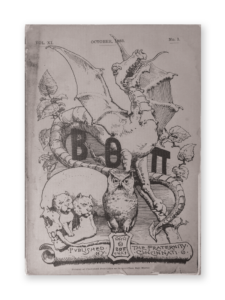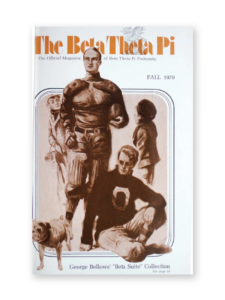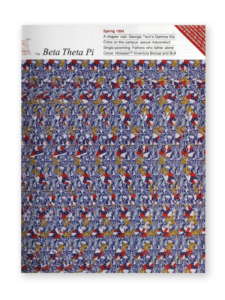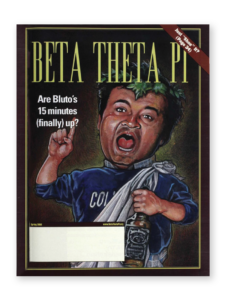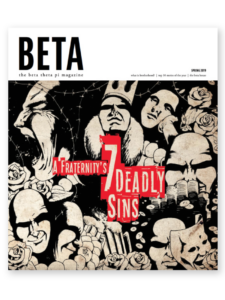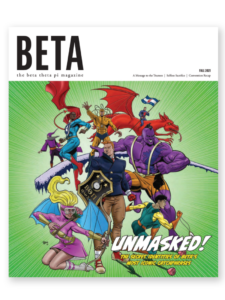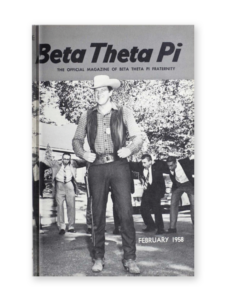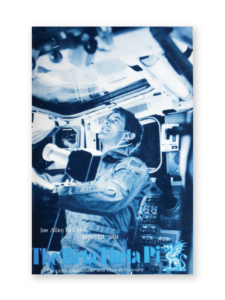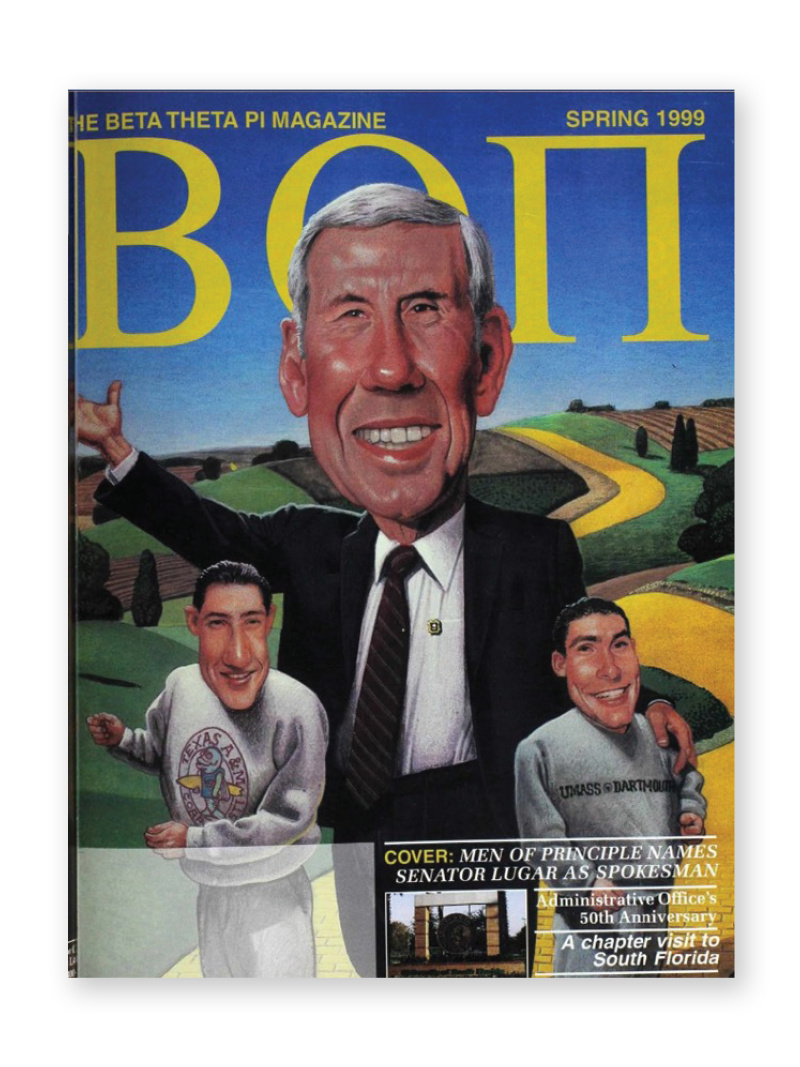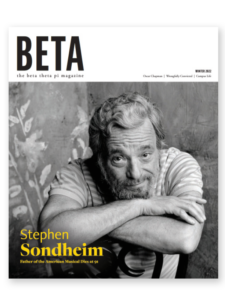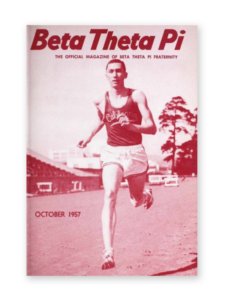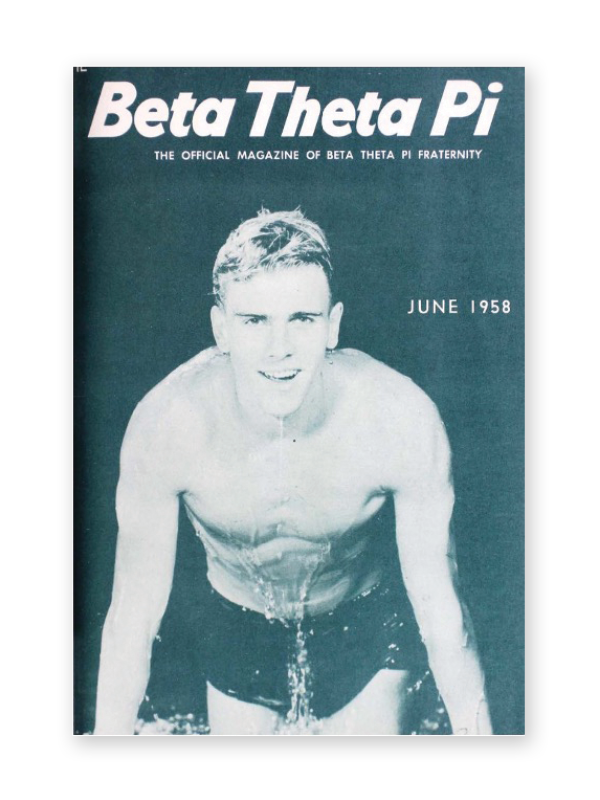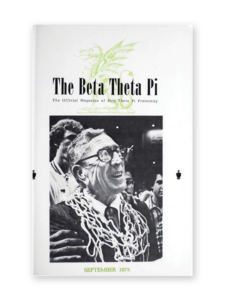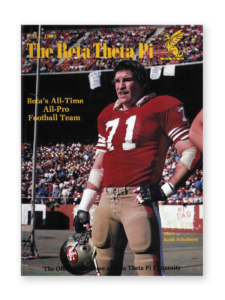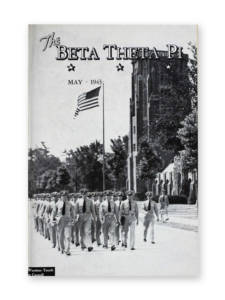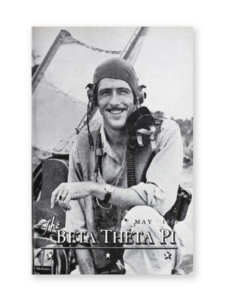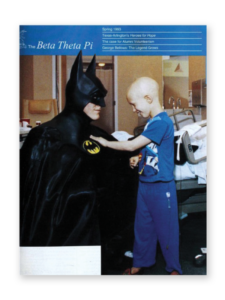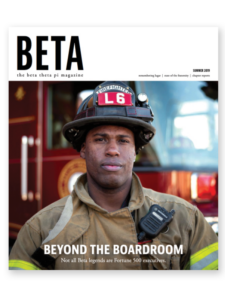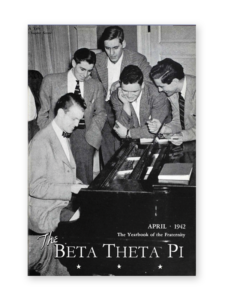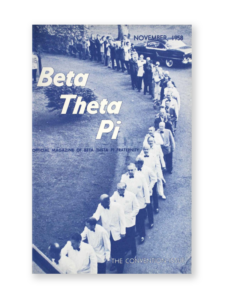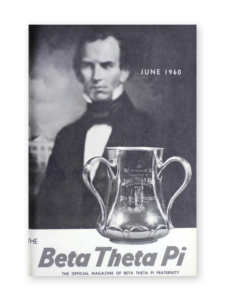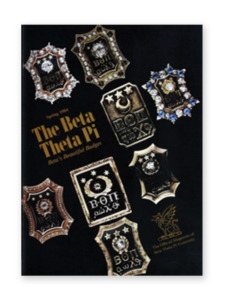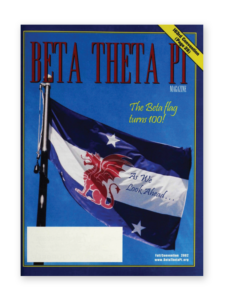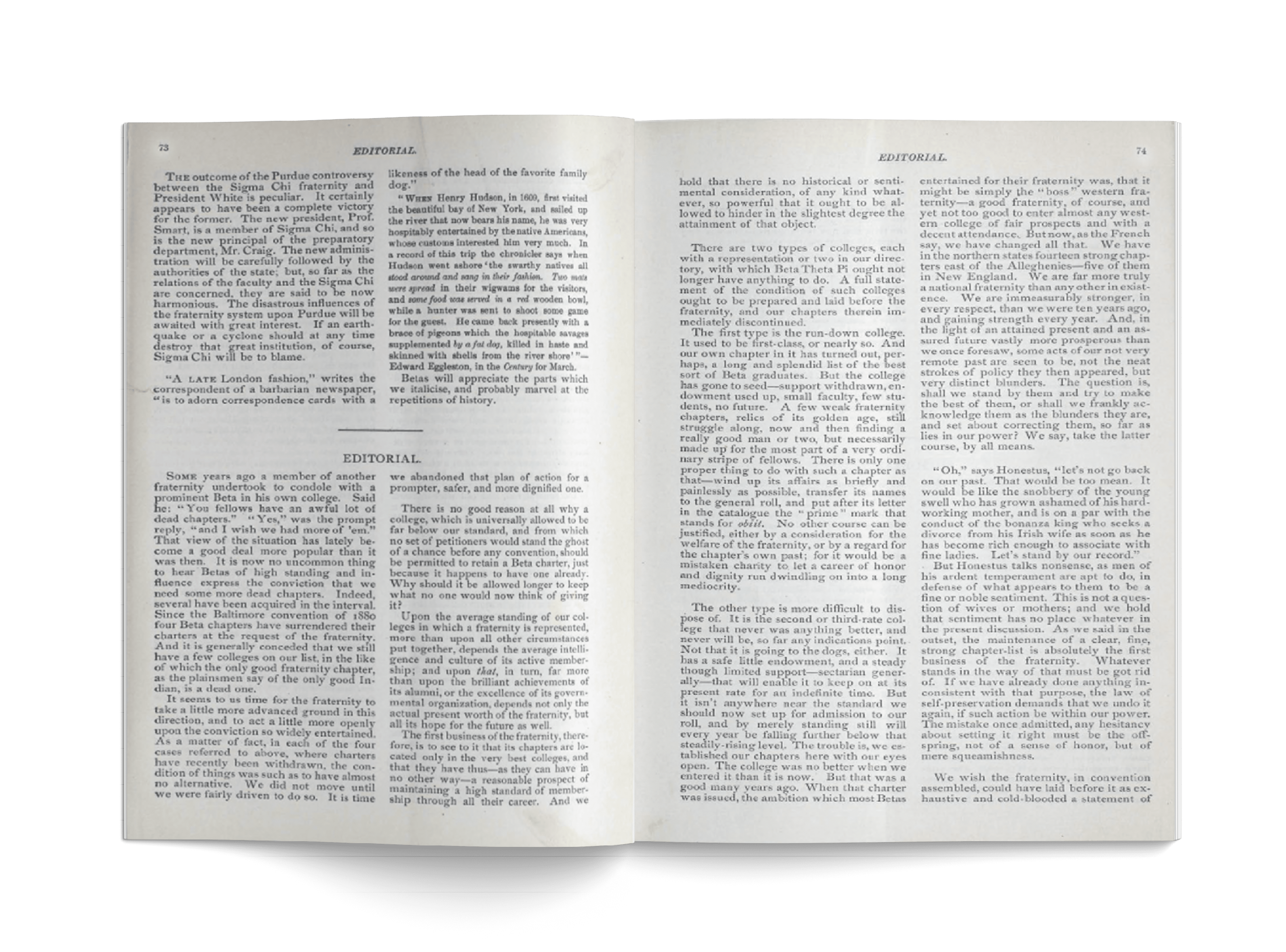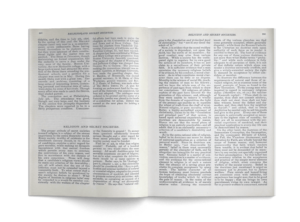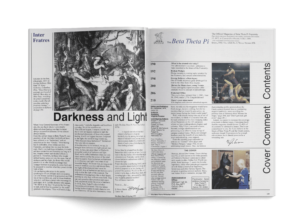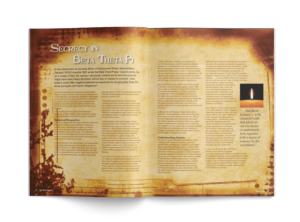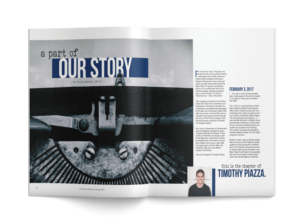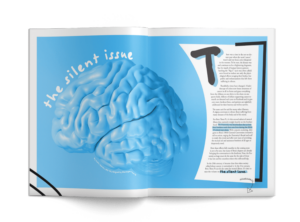In this final installment celebrating The Beta Theta Pi’s 150th anniversary, Beta’s editorial team has chosen to conclude the milestone year in true birthday fashion: by recognizing some of “the best of the best” covers, topics, words of wisdom and contributors that have helped preserve and amplify Beta’s unique culture of brotherhood. Acknowledging beauty is in the eye of the beholder, and a noble attempt at avoiding presentism has been genuinely pursued, we encourage readers to enjoy the breadth and depth of coverage through the years.
The Beta Theta Pi Magazine | Anniversary Issue Part III
Scroll the page for more or use the buttons below to skip directly to a section of interest. To see the feature article in print, click here.

“No other Beta institution approaches a total chronicle of the Fraternity’s history as does The Beta Theta Pi magazine.”
– Editor L.E. (Erv) Johnson, Idaho ’53
According to a recent study of advertising and magazine specialists, 94% of first impressions are design related. Couple that with the old adage, “There is no such thing as a good magazine with a bad cover,” and, well, there have certainly been some standouts through the years. Two have even recently been recognized as the Fraternity Communications Association’s “Cover of the Year.”
Artistic Interpretation
Dragon Solidifies Iconic Beta Symbol
October 1883
Following an 1874 griffin-branded ad for Beta notepaper, Beta’s now familiar dragon first headlines The Beta Theta Pi.
Art Discovered in Beta House Attic
Fall 1979
Stumbled upon in the chapter house attic, sketches of famous artist George Bellows, Ohio State 1905, are featured in an on-campus exhibit.
Holusion Inventors Strike it Rich
Spring 1994
Texas at Arlington brothers and Holusion inventors Michael Bielinski ’86, and Paul Herber ’88, create a custom 3D coat of arms cover.
Are Bluto’s 15 Minutes (Finally) Up?
Spring 2004
Teasing an epicly sarcastic article, “Debating Idiot Greek Logic,” Animal House’s Bluto is lampooned as a tired fraternity stereotype.
Is 2.5 Good Enough?
Spring 2006
Featuring custom art with apple peel remnants forming a 2.5, the magazine prompts debate about increasing Beta’s leading GPA standard.
Secrecy in Beta Theta Pi
Spring 2007
A necessity in 1839, as expulsion was the only alternative for belonging to a fraternity, the role of secrecy in a modern society is challenged.
This is About Brotherhood
Spring 2014
Listing majority findings on what became a particularly controversial cover, the editorial team explores Beta’s first student demographic study.
A Fraternity’s 7 Deadly Sins
Spring 2019
Framed through the ancient “seven deadly sins” lens, a Dayton-area sketch artist helps depict the factors that often lead to a chapter’s demise.
Changing Face of the College Campus
Spring 2020
Named FCA’s 2020 “Cover of the Year,” five racially distinct Beta students unite in a photo shoot and talk with the editor about diversity.
Unmasked: The Secret Identities of Beta Catchphrases
Fall 2021
DC and Marvel Comic illustrator Tom Nguyen personifies the roots of eight legendary Beta catchphrases.
Famous Betas
Gunsmoke’s Matt Dillon
February 1958
James Arness, Beloit ’46, CBS’s 5-time Emmy-winning “Gunsmoke” lead actor, is encircled by his chapter for a great “Beta Yell.”
Astronaut Allen in Orbit
Winter 1983
Becoming Beta’s second astronaut behind Paul Weitz, Penn State ’54, Joe Allen, DePauw ’59, orbits aboard Space Shuttle Columbia.
Lugar Named Men of Principle Spokesman
Spring 1999
Beta’s new Men of Principle initiative signs on revered Senator Dick Lugar, Denison ’54, as its spokesman.
The Bright Knight: Remembering Adam West
Winter 2018
Named FCA’s 2018 “Cover of the Year,” Beta memorializes its true Batman, Adam West, Whitman ’51.
Sondheim: Father of the Modern Musical Dies at 91
Winter 2022
Writing his first musical living in the Beta house, Stephen Sondheim, Williams ’50, is remembered as an industry giant.
Beta Athletes
First American to Break 4-Min. Mile
October 1957
1956 Olympian and 1957 NCAA Champion Donald Bowden, UC Berkeley ’58, becomes the first American to break the 4-minute mile.
Rose Wins Gold at 1956 Olympics
June 1958
The Mark Spitz and Michael Phelps of his day, Murray Rose, Southern California ’62, becomes the winningest Olympic swimmer of all-time.
Wooden Wins 10th Championship
September 1975
Remembering table waiting chores at the Beta house to make money, UCLA Coach John Wooden, Purdue ’32, retires after historic career.
All-Time, All-Pro Beta Football Team
Fall 1985
The magazine assembles Beta’s all-time, all-pro team, led by San Francisco ’49ers’ 1985 Super Bowl champion Keith Fahnhorst, Minnesota ’74.
Mike Schmidt, Baseball’s Best
Winter 1987
Mike Schmidt, Ohio ’71, the greatest third baseman of all time, earns three National League MVPs and 1980 World Series MVP.
Beta Heroes
Wartime Touch at Cornell
May 1943
As World War II rages on, military training on campuses becomes commonplace, like at Cornell University in New York.
Major McGuire, Beta Ace
May 1945
Killed in combat over the Philippines, the U.S.’s leading air ace Tom McGuire, Georgia Tech ’46, eventually receives the Medal of Honor.
Texas at Arlington’s Heroes for Hope
Spring 1993
Dressed as superheroes, Texas at Arlington Betas brighten the spirits of terminally ill kids in Dallas and Fort Worth.
Beyond the Boardroom
Summer 2019
As not all Beta legends are Fortune 500 executives, the magazine explores five brothers who are used to avoiding the spotlight.
On the Front Lines in Ukraine
Spring 2022
Immersed in the theatre of war, Fox News Foreign Correspondent Trey Yingst, American ’16, sits down with The Beta Theta Pi.
Beta Tradition
A Yale Chapter Scene
April 1942
Yale Betas surround their piano in the chapter house, symbolizing one of the Singing Fraternity’s greatest traditions.
Trustees Lead 400 Into 119th Banquet
November 1958
At the 1958 closing banquet, tux-wearing Trustees lead 400 in song during the Convention-favorite Marching Line.
Beta Loving Cups
June 1960
The 50th anniversary Loving Cup presented to Founder Knox and Isabell headlines a feature about unique Cups owned by chapters across Beta’s Broad Domain.
Beta’s Beautiful Badges
Spring 1984
Arguably one of the Greek world’s most beautiful symbols, custom Beta badges take center stage and shine in their own inherent luster.
The Beta Flag Turns 100
Fall 2002
The Beta flag’s centennial anniversary creates a perfect opportunity to celebrate its 1902 adoption over prior “dismal failures.”

“The editors made the magazine a success. The chapter letters were full, the editorials interesting and the personal column spicy.”
– Francis W. Shepardson, Denison 1882/Brown 1883
Cemented as official magazine policy during its 1872 inception and reaffirmed in 1884, content in The Beta Theta Pi is to be strictly related to the Fraternity – member and chapter achievements and issues affecting local chapters and the General Fraternity. For a fraternity that prides itself on devotion to the cultivation of the intellect and the reputation as a “thinking organization,” an array of stimulating topics have anchored the magazine through the decades – often to critical acclaim and, yes, sometimes controversy.
Kill or Nurse Small, Weak Chapters?
November 1883
The age-old question about chapter health and whether to support or eliminate viably questionable chapters surfaces in a multi-issue, early 1880s magazine debate.
Religion and Secret Societies
April 1884
An editorial by Solon Louer, Western Reserve 1886, advocates for “strict neutrality” in terms of religion in the Fraternity given so many members’ divergent beliefs.
Darkness and Light
Spring 1993
In one of the most persuasive narratives imaginable, B. Hume Morris, Centre ’68, dares hazers to stand by their convictions: conduct your actions in the light of day.
Secrecy in Beta Theta Pi
Spring 2007
Secrecy has long been a part of fraternity life but, in the absence of the 1800s conditions that necessitated it, does it do more harm than good some 200 years later?
New Age Addictions
Spring 2013
Acknowledged as risky, the magazine investigates emerging addictions: cell phones and online pornography. Pushback was intense, but not from the audience first anticipated.
Just One of the Guys
Spring 2016
Following the Supreme Court ruling legalizing same-sex marriage, the editorial team sits down with gay Beta Drew Allensworth, Oklahoma ’15, and the brothers who love him.
A Part of Our Story
Spring 2018
Designated Beta’s “second darkest hour” alongside the Civil War, the magazine takes an unvarnished view of the hazing death of Penn State new member Tim Piazza ’19.
The Silent Issue
Winter 2020
With male depression at an all-time high, the editorial staff explores the stories of five Betas who died by suicide the prior year – and how the Fraternity can help others.
The Cannabis Conundrum
Winter 2021
Canada legalized cannabis in 2018 and two-thirds of Americans support doing so today. Yet mixed messages and inconsistent laws continue to leave campuses in a haze.

“President Shepardson placed the magazine on a very high plane … making it representative of the finest and best in Beta Theta Pi. Our goal is to maintain the same high standards.”
– Editor Gordon S. Smyth, Pennsylvania 1918
Most Betas are unaware that Willis O. Robb’s iconic “Beta Spirit” quote actually originated in a 1905 New York alumni banquet speech, “The Beta of the Future.” It is representative of so many inspiring addresses and essays published in the magazine through the years, underscoring the universal applicability of Beta values and living life as a man of principle.
The Boy in the Window Seat
Routinely featured at the closing banquet – the most prominent speaking role of each Convention – Beta Great Seth R. Brooks delivered in 1976 what many consider his most inspiring keynote address ever, “The Boy in the Window Seat.”
Listen to Seth’s original words of wisdom as delivered that year here, and follow along using the text below.
Use the toggle below to show/hide the full text of “The Boy in the Window Seat.”
Our Fraternity has many treasures. I have a great many of them collected over the years, but all of us have some of the treasures in common. The Badge we wear, our Coat of Arms, the Flag, The Code, the Ritual.
But there is another treasure about which I would speak and I have never heard it spoken of at a Convention or Beta gathering. It is a very unique treasure and you will find it in the front of Son of the Stars, our pledge manual. It is a picture which comes from that old and great Kenyon chapter. Let me describe it for you.
It is a picture of many years ago. It shows a young man sitting in a window seat. Beside him is a student lamp, an hourglass and books. His face is turned toward the pane. Dimly in the distance you see the towers of alma mater. It is night. And piercing the black canopy of the sky shining forth with radiance are three stars. They are the Beta stars. The name of the picture is “The Boy In The Window Seat.”
It is one of my favorite pictures. The Kenyon chapter years ago sent me a framed copy. But, as I look at that picture I realize that every Beta is that boy in the window seat. You and I are the boy in the window seat. My theme for this Convention keynote is a question. “What does the boy in the window seat see in the light of the radiance of the Beta stars?”
He looks out. He sees Oxford town. It is 1839. The Republic was only 63 years old. Oxford was not a frontier town, but it was a place from which many went forth with their dreams of fame and fortune in an expanding and opening west. A small college had begun in Oxford, Ohio with the building of Old Main, later Harrison Hall. That name was to live for a long time for in that Hall something remarkable and memorable happened.
The boy in the window seat looks out again and he sees eight young men. It is the night of August 8, 1839. They have come up under the elms and the stars are out. It is nearly 10 o’clock at night. They go up into Harrison Hall. They are our Founders, “of ever honored memory.” They must have been exemplary young men. I’ve looked at their pictures often. I’ve read about them. I’ve thought about them. They surely had vision. They had ideals so sound that they have endured to this night. But, the remarkable thing was they were cemented together by friendships which they believed could last through life and by enduring fidelity each to the other.
The boy looks out and he sees the growing academic world and what an experience it was to watch how rapidly in this new nation these small colleges, church schools, seminaries, academies and universities sprang up. The boy watches with the greatest eagerness as to these new colleges this Fraternity carries its message to the lives and hearts of young men.
He looks again and it is now a remarkable period in the history of this Fraternity. It is between 1860 and 1920, and it has been said that in those years we probably in this Fraternity had our pick of the cream of the crop in the American colleges where we had chapters. Some years ago I met a woman. There were no Betas in her family and it is an interesting thing that I mention this in the state of Indiana. In talking, she found out that I was a Beta and she said, “Well, when I grew up in Indianapolis, I always believed the greatest honor that could come to any man in college in Indiana was to become a Beta.” That is the reputation we had. That is the reputation the boy in the window seat came to know.
As he looked out he continued to see a galaxy of leaders. No fraternity has ever had such a galaxy. I can mention only a few — J. Cal Hanna, Willis O. Robb, Francis Sisson, Francis W. Shepardson, James L. Gavin, Bill Dawson — and the list is long.
He looks out and he sees the Silver Grays. Let me speak to you young men here tonight and ask you not to go away without realizing these Beta alumni. They are the Silver Grays. They have come from hundreds of miles — 10, 20, 30, 40, 50 years have passed by, but tonight they still have the fire and enthusiasm of the Fraternity in their hearts. They are the vital Betas that they were on campuses long, long ago. I have been to so many alumni banquets, to so many house dedications, to so many anniversaries; I’ve lived with the Silver Grays. I know them well — hundreds of them across our Broad Domain. I can give my testimony that they are the finest men I’ve ever known. Outstanding men of achievement, accomplishment, attainment, are the Silver Grays of our Fraternity.
He looks out and he sees a grim scene. He sees boys in blue and gray killing one another. But still the Fraternity goes on through those horrible years of our civil strife. He sees the Betas of Canada and the Betas of the United States in World War I and World War II, many of them laying down their lives. We hold their names in “ever honored memory.” “They shall not grow old as we that are left grow old. Age shall not weary them nor the years condemn. With the going down of the sun and in the morning we shall remember them.”
He looks out and sees the figure of Francis Wayland Shepardson, who for more than a quarter of a century was the leading fraternity figure in this country. Almost all fraternities and sororities turned to this remarkable man for his guidance, leadership, genius, selfless loyalty to the fraternity system. He was one of the great molders, shapers, builders of Beta Theta Pi and even to this day wherever I go men say to me, “You knew Shep, didn’t you?” I say, “Yes.” “Well, I shook his hand” or “He was at my Initiation” come from the questioners. Few men I have ever known in life have left such a tremendous impression upon the lives of others as did Shep. When he died we wondered what to do, but others like G. Herb Smith, Cliff Gregg, Bert Bennett and Ed Brown came along, and this amazing line of leadership has ever proceeded and the boy in the window seat has watched it.
He looked out from the window seat and he saw William Raimond Baird, the man I think knew more about the American college fraternity system than any other man who ever lived. A man who was really a genius in his life. A man who made such mighty contributions to our Fraternity and a great contribution to the entire fraternity world with his memorable Baird’s Manual.
As he sits there in the window seat he hears, as you heard tonight, the Beta songs — James Taft Hatfield’s “O Beta, thou are ever glorious.” He hears Horace Lozier’s “Oh, start the loving cup around, nor pass a brother by; we all drink from the same canteen in Beta Theta Pi.” He hears Ken Rogers — “When stars are hiding, and the moon is nowhere in the sky; And clouds are riding, and there’s no light to guide you by; If you’re a Beta, all along the way, the Beta stars will make your darkness day; For light or darkness, shine the stars of Beta Theta Pi.”
He looks out at our Beta Conventions. What remarkable gatherings they are. Think of us here, nearly 500 strong tonight. I urge you young men to see these Beta families come together, see these wives dedicated to this Fraternity, see these children. Come to know these alumni. We hear the speeches and the songs, and follow the business. I will guarantee you will turn away from this Convention with an experience you will never forget as long as you live, for there is nothing quite like a Beta Convention.
The boy looks out and he sees our great Beta athletes on playing fields and courts. He sees our great Beta scholars in the classroom, many of them Rhodes Scholars, Phi Beta Kappas, Sigma Xis. He sees the long list of Betas, the longest of any fraternity in Who’s Who in America. He looks at the General Fraternity and he is amazed to think that this remarkable thing has grown up out of the humble origin of eight young men. For this General Fraternity is an amazing organization. It is so simple, for one thing. We have no grand titles, no ornaments; we don’t wear headgear and march around and parade.
We do not bow before this and bow before that. We come together as mature, grown men acting in a mature way. We have the organization of our districts. We’re governed not by men but by a Code. We have officers. We have district chiefs who give their time, but we have the democratic process. And we move around; we do not stay in office forever. We get out, and other men just as good as we are follow us. And that’s the strength of our Fraternity. Always the infusion of new life, new ideas, new spirit, new guidance and direction.
The boy looks out and he sees Oxford. A hundred years have gone by and 1,000 Betas march down the main street of old Oxford town. He sees it 25 years later when beneath the stars on a gorgeous night we dedicate a bronze plaque on the Campanile saying that here Betas came together 125 years later to rededicate themselves to the ideals of the Founders. He sees the Campanile, and he listens as the Beta Bells peal across the campus every 15 minutes through day and into the night. He sees the Administrative Office. He remembers the great work of Ralph and Bonnie Fey, Fred and Mary Jane Brower, Ron and Lou Helman, Pete and Ann Barnhart, and the wonderful ladies in the office there over the years.
The boy in the window seat looks out and he sees that this Fraternity has been made up of men of character. Some years ago I talked with an old Indiana Beta who had been a man of international fame. He said to me, “You know, I’ve kept alive over all these years my interest in the Fraternity because I think it is an organization marked by one thing above all else — character. And there is no place in our Fraternity for men who do not believe in character.” As Hugh Stephenson told you, I was a lad of 18 when I attended my first Convention in Swampscott, Massachusetts. The thing I remember to this night, extending over all the years, is the first impression I got as I entered that hall was these men of dignity, these great men who were leading our Fraternity in that day. One of the Chiefs was talking to me the other day about Bing Baily. I said Bing Baily typified what so many men in this Fraternity have — refinement. He was a man of culture, and that has always played a large part in our history. And we’ve had another thing in this Fraternity — concern for one another. I can tell you young men some of the most touching stories you could ever hear about Betas who have traveled hundreds and thousands of miles to see some of their Beta brothers who have been ill or dying. It has been a story of concern for one another over the years.
Now, Beta Theta Pi — let me lay this on the line — isn’t just for anyone; and when you come up to pledge season, remember that. Beta Theta Pi is for those who truly walk in the light and radiance of the Beta Stars. We have no place for cheap people. We have no place for people who do not uphold and appreciate our ideals. We have never believed in second- or third-raters. We are a superior society and association of men. We believe in that, and on that we have built it over the years. In the Old Testament there is a statement that challenges us. Joshua said to his men, “Thou art a great people and hast great power.” He was not flattering them, cajoling them, puffing them up. He was saying this, because you are a great people and have great power, you have great responsibility and much is expected of you. And I say to you, we are a great people, and we have great power, and because of it much is expected of us and much we must do.
Before I come to the conclusion of these remarks, may I say something very, very personal to the undergraduates. Perhaps some of you may think I am overstepping in what I say. But, I will accept the challenge and say it unafraid and take whatever criticism may come.
I know not what fields of life you will enter, but if it is the field of politics and government, I would urge you as Betas, Canadians, Americans, young men of your generation, to have courage, will, spirit, character to go out and make government what it should be: the servant of the people and state. To keep it above dishonesty, disgrace, indecency, graft, conniving and all the things that can bring ruin upon a free people blest by freedom.
If you go into the field of education or teaching, I urge you to have the courage to see that that sacred relation of teacher and student be kept inviolate. To see that the business of education is to learn how to behave usefully, nobly and wisely. Education is something so sacred to the human mind and spirit that it must be kept upon the highest pedestal and never defiled.
I urge you, if you go into the arts, to see that they are not degraded, twisted and distorted into something they were never meant to be. Keep them pure, keep them true to the highest ideal of beauty, glory and honor, and the inward mystery of life that has created the noblest in art.
If you go into business, I urge you to be brave and courageous enough to be honest with money. Be truthful in your dealings. Make your word as good as your bond. Never sell out. Know that there is nothing more sacred in life than to go to your grave with the realization that you have been an honest, truthful, good man, no matter how poor materially you may be.
And if you go into the church, synagogue, or temple, I urge you to know that religion is life. It is of the soul of man, it is of the spirit. It is not a charade, a fad, a wrinkle. It is not something that can be distorted. “What doth the Lord require of thee but to do justly, to love mercy, to walk humbly with thy God.” That is religion. “To visit the widows and the orphans in their afflictions and to keep oneself unspotted from the world.” That is religion, pure and undefiled.
And I urge you in your family and personal life to wear your badge, something that may inspire you to honor your family and always bring honor to your own good name.
The boy in the window seat looks down on us tonight. He has looked down for 137 years. But, each of us is the boy in the window seat, and in 10, 20, 30, 40 years, other boys in the window seat will look back to this night. And they will ask, “How did those Betas of that day do what they did? How did they prove to be so true to their ideals, to hold high the torch, and to carry it forward in the long illustrious line?” So, I urge you to hold on to the brotherhood that has been so sacred to so many, to the ideals that have been anchors in so many lives. “O Beta, thou are ever glorious.” Let us be able to say that. Let us believe it. And let us remember, as we enter upon this Convention, that we are a great people, and we have great power. And to whomever much is given, of him will much be required. Much has been given to me, thank God, because I became a member of this association long, long ago. I trust I shall not be wanting in that which is required of me.


